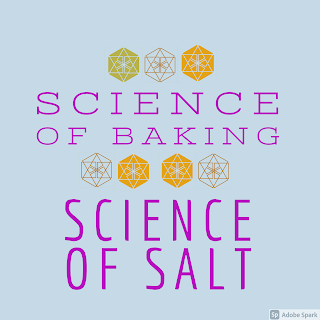Science of Salt and its Important role in Baking!
History
As far as 6050 BC, salt has been an important and integral part of the worlds history, as it was interwoven into countless civilization. Used as part of Egyptian Religious offerings and valuables trade between the Phoenecians and Mediterranean Empire. Even today the history touches our daily lives. The word "salary" was derived from the word "salt." Salt was highly valued and its production was legally restricted in ancient times, so it was historically used as a method of trade and currency. The word "salad" also originated from "salt," and began with the early Romans salting their leafy greens and vegetables. Undeniably, the history of salt is both broad and unique, leaving its indelible mark in cultures across the globe.
The fact is
that throughout history, salt—called sodium chloride by chemists—has been such
an important element of life that it has been the subject of many stories,
fables, folktales and fairy tales. It served as money at various times and
places, and it has been the cause of bitter warfare. Offering bread and salt to
visitors, in many cultures, is traditional etiquette. While records show the
importance of salt in commerce in medieval times and earlier, in some places
like the Sahara and in Nepal, salt trading today gives a glimpse of what life
may have been like centuries ago.Salt was in general use long before the
beginning of recorded history, and dating back to around 2700 B.C. the earliest
known treatise on pharmacology was published in China. A major portion of this
writing is devoted to a discussion of more than 40 kinds of salt, including
descriptions of two methods of salt extraction that are similar to processes
used today. Salt production has been important in China for two millennia or
more, and the Chinese, like many other governments over time, realized that
taxing salt would could be a major revenue source. Nomads spreading westward
were known to carry salt, and Egyptian art from as long ago as 1450 B.C.
records salt making.
How Salt is made?
There are three main methods how to obtain salt
Evaporation from sea water
Mining salt from the Earth
Creating salt brines
Sea Salt
accounts for about 3.5 percent of the worlds ocean. It is naturally produced when shallow ponds and bays dry up in the sun and the wind and large crystal of salt left behind
Rock Salt
also known as halite is present in the rocky under layers of the Earth's surface and can be extracted through deep shaft mining.
Salt Brines
while ocean is a natural salt brine, hydraulic mining or solution mining of salt involves pumping of water below the earths surface to dissolve the salt deposits and create a salt brine.
Role of Salt in Baking
To Stabilize
stabilizing yeast fermentation rate, strengthening the dough, enhancing the flavor of final product and increasing dough mixing time.
To add Flavor
adding a hint of salt to batter won't give the cake salty flavor, rather salt reduce bitterness and allow sweetness to come forward producing a more well rounded flavor. It can also add to chocolate, caramel, pie filling, jam and jellies.
Give Tenderness
salt affect the tenderness of baked goods. Salt molecules from strong bonds with flour proteins, causing the gluten molecules to become less mobile, which in turn makes the dough or batter tighter more elastic
Salt Remodel
salt denatures or loosen up egg proteins. add a little salt on egg wash to thin it down. A thinner egg wash is easier to brush onto bread or pastry to have a glossy effect.
Dough Conditioning
Salt has a binding or strengthening effect on gluten and thereby adds strength to any flour. The additional firmness imparted to the gluten by the salt enables it to hold the water and gas better, and allows the dough to expand without tearing. This influence becomes particularly important when soft water is used for dough mixing and where immature flour must be used. Under both conditions, incorporating a maximum amount of salt will help prevent soft and sticky dough. Although salt has no direct bleaching effect, its action results in a fine-grained loaf of superior texture. This combination of finer grain and thin cell walls gives the crumb of the loaf a whiter appearance.
Fermentation
slows the rate of fermentation, acting as a healthy check on yeast development, salt prevents of any development of any objectionable bacterial action or wild types of fermentation, it assist in oven browning by controlling the fermentation and therefore lessening the destruction of sugar. Salt also checks the development of any undesirable or excessive acidity in the dough. It thus protect against the undesirable action in the dough and affects the necessary healthy fermentation required to secure a finished product a high quality.
Soruces: https://seasalt.com/salt-101/about-salt/history-of-salt
https://www.thespruceeats.com/how-is-salt-made
https://www.shaunasever.com/journal/2011/06/why-salt-is-important-in-baking.
https://www.baking-sense.com/2017/03/29/baking-ingredient-salt/
Comments
Post a Comment